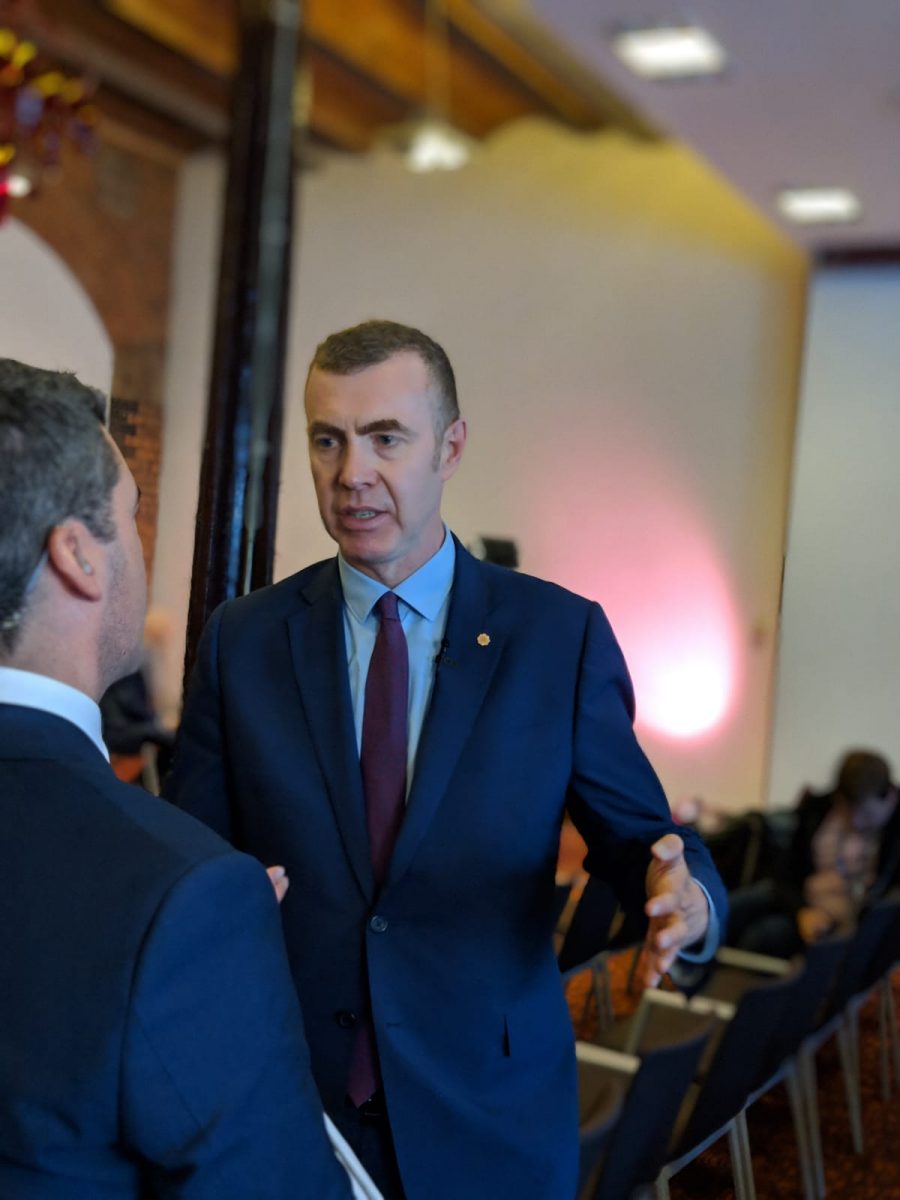Politics
Plaid plot Wales’ way post-Brexit

PLAID CYMRU Leader Adam Price has said that it is time for Wales to focus on “new opportunities” in a “new landscape” as he shifts his party’s position on Brexit ahead of the UK leaving the EU on Friday.
The Plaid Cymru Leader made his remarks delivering a keynote speech on Beyond Brexit: Charting a new course at the Pierhead building on Monday, January 27.
Speaking ahead of the speech, Adam Price said that whilst “we weren’t all leavers” the UK and Wales would now be leaving the EU and that there was “little point” in fighting “yesterday’s battles”. He said that it would be the “red dragon of Wales” taking back control and that Plaid Cymru would set Wales on a new course in a post-Brexit Wales.
Adding that “simply defending the status quo” was no longer enough, the Plaid Cymru leader said it was “time to focus on the new opportunities in the new landscape” and that a “positive post-Brexit plan for Wales” with more powers for the Senedd would be needed to “tackle and solve Wales’ economic problems”.
Mr Price said that Wales could have powers to vary corporation tax or VAT after it leaves the EU. Under EU rules, countries must apply a minimum standard VAT rate of 15%. He added that powers over public procurement rules could be devolved to Wales alongside a government “Made in Wales” and “Buy Welsh” programme.
The Plaid Cymru Leader pledged that his party’s offer on health, education and the economy “is the same” to those who voted leave or remain, “wherever in Wales” they lived adding that leaving the EU would not mean “leaving the hope of a new Wales behind”.
Wales, and the rest of the UK, will be leaving the EU on January 31.
Speaking ahead of his keynote speech, Plaid Cymru Leader Adam Price AM said: “We weren’t all leavers but we are all leaving now and there is little point in continuing to rehearse these arguments or fighting yesterday’s battles. That, to me, is emblematic of future-facing Wales. It is the Red Dragon of Wales that will be taking back control, and if Plaid Cymru has anything to do with it, eventually setting us on a new course.
“Simply defending the status quo is no longer enough. It’s time to focus on new opportunities in the new landscape. Northern Ireland has a special status. The north of England will see a lot of investment. Scotland will be a continued focus because of the movement for independence. We need a positive post-Brexit plan for Wales and a stronger Senedd with more powers to tackle and solve Wales’ economic problems.
“We could have new flexibility over tax – such as powers to vary corporation tax or VAT for key sectors like construction and tourism. We could also secure power over public procurement rules to allow to support our foundational economy programme based on a local import substitution alongside a government-backed Made in Wales and Buy Welsh programme.”
Adam Price said it was time to turn the “power grab” into a “power gain” and take advantage of some of the “flexibilities” afforded to Wales outside the European Union including:
· The ability of the Wales Development Bank to allow to lend without the constraints of state aid rules
· Devolve power over corporation tax, capital gains tax on property, the apprenticeship levy and the air passenger duty.
· Develop new procurement rules to support our foundational economy.
· Create Welsh freeports at key ports and airports.
· Welsh work permits as part of a Welsh migration system.
Plaid Cymru Leader Adam Price added: “Instead of focusing on the losses from the Single Market, we have now to start to focus on the new opportunities in the new landscape. We must ditch the old sense of resignation: when England catches cold, Wales catches pneumonia. It’s time instead to dose up on some economic Vitamin C – inject the Welsh Vavavoom into our new way of thinking.
“Leaving the European Union does not mean leaving the hope of a new Wales behind and for those of us who want to channel our positive energy we can turn the next fifteen months into Wales’s transition period.”
Crime
Welsh Lib Dems urge ministers to rethink rates relief for struggling pubs and cafés

Calls grow for Welsh Government to match support offered to English venues
THE WELSH LIBERAL DEMOCRATS have urged the Welsh Government to review its business rates policy, warning that scaling back support for pubs and hospitality risks further closures across towns and villages.
Party leader Jane Dodds, who represents Mid and West Wales in the Senedd Cymru, said ministers should act quickly to protect local venues after additional support for pubs and music venues was announced for England by the UK Government.
The measures announced by the Chancellor do not automatically apply in Wales, leaving uncertainty over whether similar help will be introduced here.
Hospitality businesses across Pembrokeshire and Carmarthenshire have already reported rising energy bills, higher wage costs and reduced footfall since the pandemic. From April, current business rates relief is expected to be reduced, a move the Liberal Democrats say could place Welsh firms at a disadvantage compared with competitors over the border.
Dodds said that pubs, cafés and restaurants form “the heart of our communities” and warned that withdrawing relief now would be “a serious mistake”.
She told the Senedd that support “cannot stop at pubs alone” and should extend to the wider hospitality sector, including restaurants and family venues that rely heavily on seasonal trade and tourism.
“When questioned, the First Minister said she needed to examine the details of the English package before committing to anything similar for Wales,” Dodds said. “Without urgent action, we risk losing viable, well-loved businesses that communities simply cannot afford to lose.”
The party is also calling for UK-wide action, including a temporary reduction in VAT for hospitality and tourism, funded by a windfall tax on large banks.
However, Welsh Government sources have previously argued that decisions on rates relief must be balanced against pressures on public finances, with ministers required to prioritise health, education and other frontline services within a fixed budget. They have said any additional support would need to be affordable and targeted.
Industry bodies have echoed concerns about the challenges facing the sector. Trade groups say many independent pubs and cafés continue to operate on tight margins, particularly in rural areas where they serve as community hubs as well as businesses.
Local operators say clarity is now key, with decisions on staffing, stock and opening hours often planned months in advance.
With the next financial year approaching, hospitality owners will be watching closely to see whether Wales mirrors England’s support – or leaves businesses to absorb the extra costs alone.
international news
Mandelson quits Labour over Epstein controversy

Former cabinet minister says stepping down is ‘in best interests of the party’ as questions raised over historic payments
LORD MANDLESON has resigned his membership of the Labour Party, saying he does not want to cause “further embarrassment” following renewed controversy over his past links to convicted sex offender Jeffrey Epstein.
The former cabinet minister and one-time UK ambassador to the United States confirmed his decision in a letter to Labour’s general secretary after fresh documents released by the US Department of Justice appeared to reference him in connection with Epstein’s finances.
The files suggest that three payments of $25,000 — totalling $75,000, about £55,000 at today’s exchange rates — were allegedly made to Peter Mandelson in 2003 and 2004.
Lord Mandelson said he had “no record or recollection” of the transactions and believes the allegations may be false, but intends to investigate the matter himself.
In his resignation letter, he wrote that he felt “regretful and sorry” to be linked again to what he described as the “understandable furore” surrounding Epstein.
He added that stepping down from party membership was the responsible course of action while he reviewed the claims.
“I do not wish to cause further embarrassment to the Labour Party,” he said. “I have dedicated my life to the values and success of the party and believe I am acting in its best interests.”
Ambassador role ended
Lord Mandelson had been appointed the UK’s ambassador to Washington by Prime Minister Keir Starmer in December 2024.
However, he was removed from the post last year after earlier revelations about his past friendship and contact with Epstein, including emails showing communication after the financier’s 2008 conviction.
The latest release of files has also included photographs said to show Lord Mandelson alongside an unidentified woman. He said he could not place the location or circumstances of the images.
There is no suggestion that appearing in the documents or photographs indicates criminal wrongdoing.
‘Deep regret’
Earlier this weekend, Lord Mandelson reiterated his regret for ever having known Epstein and apologised “unequivocally” to the women and girls who suffered abuse.
“I want to repeat my apology to the women and girls whose voices should have been heard long before now,” he said.
Epstein died in prison in 2019 while awaiting trial on sex trafficking charges, but investigations into his network of associates continue to generate political fallout on both sides of the Atlantic.
Labour has not yet issued a detailed statement beyond confirming it had received Lord Mandelson’s resignation.

News
Policing powers stay with Westminster as devolution debate reignites in Wales

THE UK GOVERNMENT has ruled out handing control of policing and criminal justice to Wales, triggering fresh political debate over whether the Senedd should ever take responsibility for law and order.
South Wales Central Conservative MS Andrew RT Davies said ministers were “right” to block further devolution, warning that separating Welsh forces from England would weaken efforts to tackle organised and cross-border crime.
His comments follow an exchange in the House of Commons, where Liz Saville-Roberts pressed the Home Secretary on transferring powers to Cardiff Bay. The Government confirmed it does not believe policing and criminal justice should be devolved.

“Must reflect the reality on the ground”
Mr Davies said proposals from Plaid Cymru and other devolution campaigners ignore how crime and communities operate in practice.
“The Senedd must not be put in charge of policing,” he said.
“Senedd ministers have an appalling track record on law and order. As senior police officers say, reforms must reflect the reality that many Welsh communities look east towards England far more than they do to other parts of Wales.”
Senior officers have echoed that concern.
Amanda Blackman, Chief Constable of North Wales Police, recently said her force area is “very much connected from a criminality perspective” to Merseyside and Cheshire.
“Our population move, if you like, is more east to west, west to east than it is north to south,” she said, pointing to the daily flow of commuters, shoppers and offenders across the border.
Long-running constitutional argument
Wales currently has four territorial forces – Dyfed-Powys, South Wales, Gwent and North Wales – but funding, legislation, prisons and the courts all remain under Westminster control.
Supporters of devolution argue this creates a “jagged” system, where services like health, housing and education are run by the Senedd but justice is not.
Plaid Cymru has repeatedly called for Wales to follow Scotland and Northern Ireland, both of which run their own justice systems.
They say decisions made in Cardiff could better reflect Welsh priorities, invest more in prevention, and link policing with mental health, youth services and social care.
A Plaid source said: “Communities in Wales should not have to rely on London to decide how their streets are policed. Justice should sit alongside the other services that deal with the causes of crime.”
Cost and complexity concerns
But critics warn that splitting away from England could come at a high price.
Establishing a separate legal and prison system would mean new administrative structures, courts oversight, inspection bodies and funding arrangements.
There are also practical questions around serious organised crime, counter-terrorism and specialist units that currently operate across England and Wales.
Former policing leaders have previously cautioned that criminals do not respect borders, and intelligence-sharing could become more complicated if systems diverge.
For rural areas such as Mid and West Wales, including Pembrokeshire, officers often work closely with English counterparts on drugs, county lines and cross-border burglary gangs.
Little appetite for change – for now
With the current Government making clear it has no plans to devolve the powers, the issue appears unlikely to change in the short term.
However, with constitutional reform regularly debated ahead of future elections, policing remains a live political question.
For now, responsibility for law and order stays firmly with Westminster – but the argument over who should control Wales’ justice system looks set to continue.
-

 Health5 days ago
Health5 days agoConsultation reveals lack of public trust in health board
-

 News6 days ago
News6 days agoCaldey still unsafe, survivors warn — despite Abbey’s reform claims
-

 Community5 days ago
Community5 days agoPembrokeshire students speak at national Holocaust Memorial Day event
-

 News6 days ago
News6 days agoKurtz raises Gumfreston flooding in the Senedd as petition deadline nears
-

 Community7 days ago
Community7 days agoStorm Chandra: Morning impacts across Pembrokeshire
-

 Entertainment7 days ago
Entertainment7 days agoRapunzel brings festive magic to Torch Theatre
-

 Crime7 days ago
Crime7 days agoMan denies murdering brother as jury hears of ‘ferocious attack’ at Morriston flat
-

 Crime3 days ago
Crime3 days agoPembroke man accused of child sex offences sent to Swansea Crown Court



























